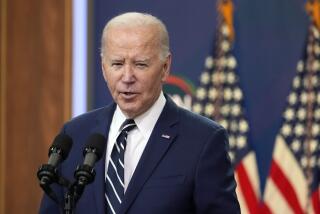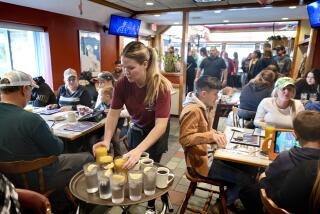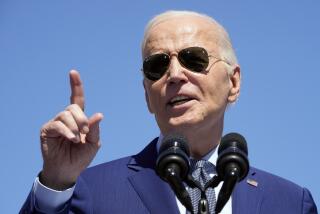Analysis: Impact of jobs report on presidential contest minimal
WASHINGTON -- The economy is, by virtually everyone’s account, the driving force behind the 2012 election, and yet, more than three months into a renewed economic slowdown, the impact has yet to dent President Obama’s standing in the polls.
With yet another discouraging jobs report on Friday – a seasonally adjusted figure of 80,000 net new jobs created last month -- Obama’s apparent ability to defy economic gravity highlights some key electoral realities: Partisanship trumps statistics, national figures may be tempered by those in battleground states and undecided voters tend to tune out much of what happens in campaigns, at least until the fall’s presidential debates, when the remaining holdouts sometimes take sides.
The economy began showing signs in April of running out of steam. Since then, three monthly jobs reports in a row have come in below analysts’ expectations, and numerous other economic indicators have soured. But no trace of that has shown up in the extensive polling of the presidential race. In Gallup’s daily tracking poll, for example, Obama and Republican Mitt Romney were essentially tied from the third week of April until the middle of last week when Obama opened a small lead.
Other polls disagree about the relative placement of the two candidates, but all show the same overall pattern – no major movement despite the worsening economic climate.
That lack of movement could change if the months continue to go by without an upturn, of course. And Romney certainly plans to continue hammering home his argument that Obama’s policies have failed. Friday, he went to a hardware store in Wolfeboro, N.H., the picturesque, lakeside town where he and his family have gathered for a week of vacation, to denounce the latest jobs figures as a “kick in the gut to middle-class families.”
“There’s a lot of misery in America today,” Romney said. “These numbers understate what people are feeling and the amount of pain which is occurring in middle-class America.”
Romney mocked Obama’s campaign slogan of “Forward,” which he said was out of sync with reality.
“ ‘Forward’ doesn’t look a lot like forward to the millions and millions of families that are struggling today in this great country,” he said. “The president doesn’t have a plan, hasn’t proposed any new ideas to get the economy going, just the same old ideas of the past that have failed. I have a plan.”
Obama, campaigning in Ohio and Pennsylvania, said the new jobs that had been created were a “step in the right direction,” but he added that he wasn’t satisfied with the rate of job creation.
“We can’t be satisfied, because our goal was never to just keep on working to get back to where we were back in 2007,” he told an audience in Poland, Ohio, a small city south of Youngstown, near the Pennsylvania border. “I want to get back to a time when middle-class families and those working to get into the middle class have some basic security. That’s our goal.”
For now, however, both men appear to be largely preaching to the converted. On the economy, as with most issues, partisanship strongly colors how people perceive news and the context in which they place it.
Last month, for example, the Pew Research Center asked Americans whether the news they were hearing about the economy was “mostly good,” “mostly bad” or mixed. Republicans, 52% said the news they were hearing was “mostly bad” while among Democrats, only 23% said so.
Separately, a Gallup poll, also last month, found that 83% of Republicans said Obama was largely to blame for the nation’s economic problems. Among Democrats, 90% blamed his predecessor,George W. Bush.
Undoubtedly, there is some level of economic news that would change the minds even of partisans – a significant jump in the unemployment rate on the one side or a gusher of new jobs on the other. So far, however, the news has fallen well short of that, keeping the campaign in a sort of economic purgatory.
Earlier this year, when the economy seemed to be gaining strength, Obama appeared to benefit. But that rise mostly came from Democrats who seized on the improving economic data to rally around a president they already were inclined to support. At this point, partisans on both sides have pretty much moved to their respective corners, and the presidential race reflects a deeply entrenched split.
Over the past 20 years, Republican presidential candidates have averaged 44.5% of the popular vote in presidential campaigns; Democratic candidates have averaged 48.4% (third party candidates account for the rest). Currently, in Gallup’s tracking, that’s exactly where the two candidates sit: Obama 48%, Romney 44% -- each man polling at the generic average level of his party.
The relatively small number who remain undecided or willing to change their minds generally are people who do not closely follow the news. In another Pew poll taken last month, news of the economy was the story that had garnered the most attention, but only 35% of those surveyed said were following the subject “very closely.”
Finally, many of the battleground states have economies that are doing better than the nation as a whole. Political scientists generally say that voters respond more to national economics than to the economies in individual states, but it’s possible that in a few key states this year, the situation may be different.
In Ohio, for example, the unemployment rate was 7.3% in May, down from a peak of 10.6% in January 2010 and from 8.6% at the start of Obama’s term. On several occasions in the last couple of months, that state’s Republican governor has touted improving economic conditions there. So have the GOP governors in Virginia and Florida, two other key battlegrounds, sometimes speaking in ways that conflict with the Romney campaign’s message.
More to Read
Start your day right
Sign up for Essential California for news, features and recommendations from the L.A. Times and beyond in your inbox six days a week.
You may occasionally receive promotional content from the Los Angeles Times.







